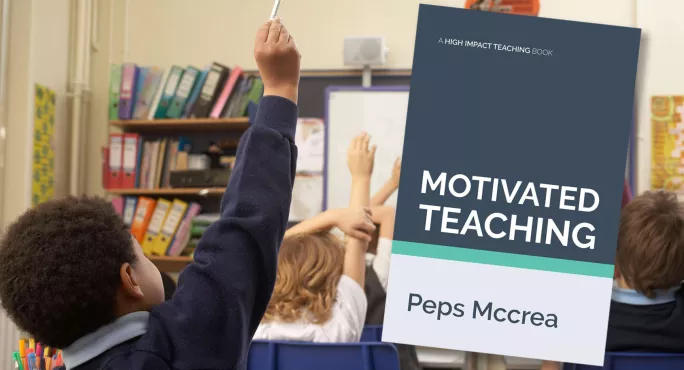- Home
- Book review: Motivated Teaching by Peps McCrea
Book review: Motivated Teaching by Peps McCrea

Motivated Teaching: harnessing the science of motivation to boost attention and effort in the classroom
Author: Peps McCrea
Publisher: CreateSpace Independent Publishing Platform
Details: 128pp; £11.00
ISBN: 978-1717367204
This book skips nimbly between the complexities of the brain science of motivation and the classroom realities of a fractious Year 9 set on a hot Friday afternoon.
Teachers and education leaders will be no stranger to Peps McCrea: his book Memorable Teaching helped us make the learning stick for students. His latest book, Motivated Teaching, helps us make them want to learn.
The title of this book temptingly offers the silver bullet for teachers: a class full of bright-eyed learning enthusiasts hanging on their every word, eager to learn, work hard and succeed.
It’s easy to feel that the students should arrive at your lessons like this every day - and, by gosh, we all wish they would. But this book is less The Demon Headmaster, in which students are hypnotised into compliant, consistent learners, and more Mrs Beeton’s Book of Household Management, in which a recipe can be followed to get close to the outcome you desire, depending on your skill in the kitchen.
The science of motivation
It’s not about magic: it’s about the science of motivation, and how teacher and school can introduce consistent strategies, routines and ways of teaching that build student motivation and make it easier for students to want to learn what you’re teaching.
We’ve all known the draining difficulty of being the energy source for a group of students unwilling or unable to dredge up their own motivation. The promise of a wellspring of student motivation bubbling under our classes is tempting and exciting.
And McCrea’s books are also short. You can dip in over a half-hour in a queue, or while waiting for your own child to finish a swimming lesson - no great commitment of time, but a wallop of common sense and valuable insight that can have an impact on your lessons tomorrow. It’s a powerful combination.
This book details some straightforward good practice, which should be in place in every classroom. This is not all or nothing: you can start with one tiny change and work up to larger changes as success builds. If you are a reader of these types of books (and presumably you are, as you are reading this review of one), you will already be familiar with some of the strategies and methods promoted in Motivated Teaching.
The mechanics of motivation
This book, like the previous books in the series, is laid out in an accessible manner - you can pick out the key ideas and themes in a quick flick through. I’m wary of books that make big promises and then seem loaded with inspirational waffle, but this definitely isn’t that.
I was impressed and reassured by the first section, which laid out the scientific understanding we have of motivation and the brain, and led convincingly to the strategies recommended in the subsequent chapters.
As a total research geek, I also enjoyed the ease with which I could refer to the sources that were used to back up the assertions of the book. You don’t have to be interested in this for the book to be useful, but it gives the book a solidity that I welcomed.
Motivation is relatively easy to define, but it is harder to understand how to build the most sustainable type of motivation - intrinsic motivation - in your students. McCrea explains how the mechanics of motivation go very deep into our subconscious.
You might be able to motivate a class to work hard on an assignment with the promise of a small reward or accolade, but unless you engage with the core drivers of motivation for that individual, you might well still end up with a student who arrives at each of your lessons feeling like they don’t want to be there. This book focuses on long-term motivation for learning, and not on quick fixes.
No magic wand
There are no surprises in most of the chapters - the author suggests and reframes many strategies that we know are present in the practice of good teachers. These strategies are most powerful if they are part of the school culture and climate. But, if a significant impact on that is beyond your influence, you can start to see real changes in your own classroom and the motivation of your students by consistently applying them yourself.
As with all good teaching books, I found myself reflecting on how these ideas can be applied to my own life. There was familiarity here; the book Atomic Habits: an easy and proven way to build good habits and break bad ones, by James Clear, and Nudge, by Malcom Gladwell, are both on my bookshelf, and McCrea applies some similar ideas to the school setting with great effect.
This publication is about long-term changes to our classrooms and schools. There is both the reassuring and terrifying notion that motivation for learning is constantly built and refined, for our students and for all of us. It is within our gift to influence this for the better or worse.
There is no magic wand: you have to work at it. This book gives a straightforward practical guide to that work.
Jo Foster is director at the Institute for Research in Schools, and a former science teacher
Keep reading for just £1 per month
You've reached your limit of free articles this month. Subscribe for £1 per month for three months and get:
- Unlimited access to all Tes magazine content
- Exclusive subscriber-only stories
- Award-winning email newsletters

